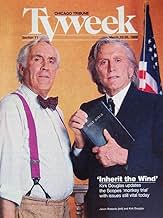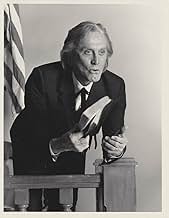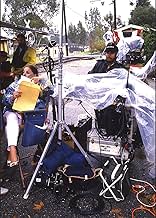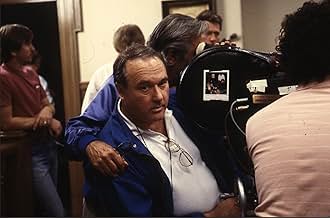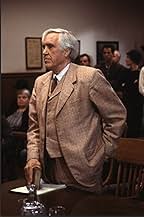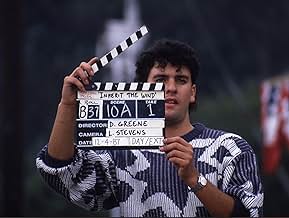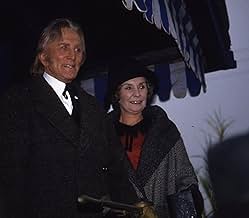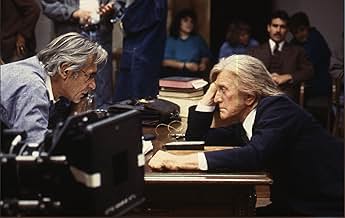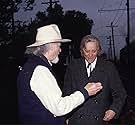Ajouter une intrigue dans votre langueA biblical orator opposes a liberal lawyer defending a man for teaching Darwinism in the 1920s South.A biblical orator opposes a liberal lawyer defending a man for teaching Darwinism in the 1920s South.A biblical orator opposes a liberal lawyer defending a man for teaching Darwinism in the 1920s South.
- Réalisation
- Scénario
- Casting principal
- Récompensé par 2 Primetime Emmys
- 2 victoires et 1 nomination au total
- Bailiff
- (as Thom McCleister)
- Radio Newsman
- (as Richard Gilbert Hill)
Avis à la une
This isn't to say its bad, its not. The problem is that compared to the original Spencer Tracy film this film comes off as a good summer stock to the originals Broadway show case.
The cast is game. Kirk Douglas is perhaps a bit odd at first as the William Jennings Bryan character, but after a few minutes he slips into the groove and all is fine. Jason Robards' is excellent, unfortunately there is something about the way this was put together for TV that kills his momentum in the home stretch.
Seeing this with out commercials doesn't help since the pauses still are there.
If its on try it, but if you must see some version of this go for one of the other two.
*** 1/2 (out of 4)
The second of three remakes of the 1960 Spencer Tracy/Frederic March film once again takes a look at the infamous Scopes trial. The film centers on a teacher who is arrested for teaching the theory of evolution. A religious prosecutor (Kirk Douglas) takes on the defender (Jason Robards) in a case about the right to think. I personally think that the 1960 film is one of the greatest movies ever made and it contains some of the most powerful actor of any movie ever made. It would be rather silly to go into the remake expecting anything as powerful but this film actually comes pretty close. The film has been slightly rewritten and it takes a look at the case from a different side but the movie remains quite powerful and contains some very good acting. The only real problem here is that the movie only runs around 96-minutes, which means we lose some character development. The actual real case has pretty much been proved as a fraud but it certainly makes for an interesting debate, which carries over very well to film. I think, like the original film, this one is a bit too one sided and shows the religious aspect unfairly but while saying this there's no doubt that the original trial showed evolution in an unfair way. As I said earlier, I think both Tracy and March delivered two of the most powerful performances in the history of film but Robards and Douglas do great work here. Douglas really gets into his character so much that you feel as if you're watching the real guy and not Douglas giving a performance. His speech in the church early on is among some of the best preaching I've seen from any actor or any real preacher. Robards was an excellent choice to go up against Douglas and he too delivers a strong performance and the two men together, during the final courtrooms scene, contain enough fireworks to really get your blood pumping. Darren McGavin, John Harkins, Megan Follows and Gene Simmons all add great supporting in their performances. In the end, this film is far from the 1960 version but it's still a very good little gem with great performances and an always interesting story.
Jason Robards played Drummond/Darrow very well - in the tradition of Muni, Tracy, and Melvyn Douglas. But it was the performance of Kirk Douglas as Brady/Bryan that was unique. As I have mentioned elsewhere in these reviews, Bryan did have valid reasons to dislike Darwinism aside from religious feelings. The issue of Social Darwinism, created by an English elitist snob named Herbert Spencer, had been grabbed by various people in power positions in big business and politics that suggested that the best people were the top of the evolutionary tree - and that big business had the right to destroy small competitors due to "survival of the fittest". Bryan hated this idea, as opposite to Jeffersonian Democracy. He actually intended, after his own humiliation on the witness stand by Darrow to put Darrow on the stand to explain his acceptance of Social Darwinism. Judge Raulston, the trial judge, refused to allow this.
If that had been brought out in this production, it would have set it apart and given a more balanced view of the two parties who clashed in Dayton. Instead, Douglas played Brady like a revivalist (similar to Begley, without Begley's physical resemblance to Bryan). But he also kept trying to keep up the friendly feelings that Darrow and Bryan had when both were fighting on the same side on political issues from 1893 to 1908. While all the productions include those moments of nostalgia between them, this attempted to suggest that Douglas/Brady hoped to "save" the soul of Robards/Drummond. It was a curious idea, but it just did not seem realistic (given their diametrically opposite views on evolution and the Tennessee law). I give this a 7 for the production but the approach was a misfire.
In case you haven't seen the original, the story is an adapted version of the famous Scopes Monkey trial in the 1920s. A teacher in America's Deep South, teaches his students about Charles Darwin, and he's arrested. The majority of the film takes place in the courtroom, as two legendary lawyers battle the issue. So, if you don't like one of the two lead actors, it will greatly affect your enjoyment of the film. I'm not a Spencer Tracy fan, but with Jason Robards taking his place in the remake, I began to appreciate Spence's performance better. I know there are some people out there who are Jason Robards fans, but I'm not one of them. He's just not likable, and he always seems tired, bored, slightly angry, and wishing he was anywhere but on a film set.
If you really like Kirk Douglas, you'll probably want to see this movie, but it's not nearly as good as the original. Jean Simmons plays Kirk's wife, and even though she gives a good performance, there was nothing really wrong with her predecessor, Florence Eldridge. Watch the original, and if you really enjoy the story and like Kirk Douglas, then you can rent this one.
Le saviez-vous
- AnecdotesThe real William Jennings Bryan ran for President three times: 1896, 1900, and 1908. Bryan was the first Presidential candidate to extensively barnstorm during a Presidential campaign in an era when most candidates did not. Although it's suggested that he might be contemplating a run in the next election, which would have been in 1928, it's highly unlikely. He did serve in public office twice - as Congressman from Nebraska from 1891 to 1895 and as Secretary of State under Woodrow Wilson from 1913 to 1915, when he resigned over the country's policy toward Germany after the Lusitania was sunk. Despite his fundamentalist Christian beliefs, he was considered as Liberal and Progressive, supporting anti-Imperialist policies and trust-busting.
- GaffesIn several courtroom scenes when the focus is on Bertram Cates, the actor, Kyle Secor, wears glasses in which you can see the reflection of the production lights as well as white flags used by the production staff to mute the lights. In the 1930s, courtrooms would have utilized electric lights with a milk glass lamp shade known as a "schoolhouse light".
- Citations
Rachel Brown: I don't understand it, and what I do understand I don't like. I don't believe I came from apes and monkeys. You see, I really haven't thought very much. I was always afraid of what I might think. It seemed safer not to think at all. Maybe - maybe what Mr. Darwin wrote is bad. Bad or good I think ideas have to come out. I think they should be heard. I don't think they ought to pass laws against them.
- ConnexionsFeatured in The 40th Annual Primetime Emmy Awards (1988)
Meilleurs choix
Détails
- Date de sortie
- Pays d’origine
- Langue
- Aussi connu sous le nom de
- Inherit the Wind
- Lieux de tournage
- Sociétés de production
- Voir plus de crédits d'entreprise sur IMDbPro

